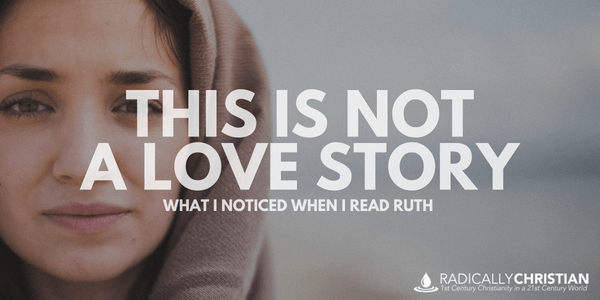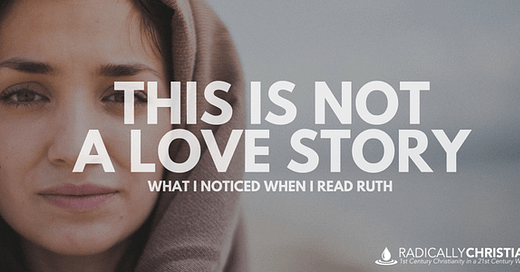This is NOT a Love Story: What I Noticed When I Read Ruth
It would be easy to see the book of Ruth as a love story: A beautiful young woman, who has tragically lost her husband, meets a rich, handsome, and godly man who marries her and they live happily ever after. But that’s a modern fairytale, not a biblical story. Romance and beauty are important themes in our stories, but the important themes in this story are things like showing kindness to the dead and caring for destitute immigrant workers and widows (things most Christians hardly think of as important biblical themes). So, let’s take a closer look.

Where It Fits in the Story
If you read the books of the Bible in their modern Christian order, then you would read the story of Ruth between Judges and 1 Samuel. This makes sense because the story occurs “in the days when the judges ruled.” However, the problem with this order is that it interrupts the big-picture story of how God brought Israel into the garden of the promised land, they disobeyed and were exiled, but eventually returned to wait for their Savior-King.
But when you read the Bible in the Hebrew order, you read the big-picture story in the Torah and the Prophets, and then come back and read some of the “Writings,” which help fill in some gaps as well as give wisdom and understanding. This is the order in which I’m doing my Bible reading and it has been incredibly helpful.
The story of Ruth proves to be an origin story for King David. And knowing what we know about where the story is headed, this story fills us with hope that if God could bring David’s family back from the brink of destruction once, he could certainly do it again. After the Babylonian exile, the family of David was like a tree stump, but a branch would grow from it again.
Kindness to the Living and the Dead
When Naomi and Ruth arrive in Bethlehem, they are two destitute widows. Ruth is an immigrant from a country despised by Israelites. And life has been so hard on Naomi that her old friends in town don’t recognize her. She is now a “bitter” old woman. She believes God is against her and that she will die in squalor.
But perhaps the worst tragedy of all is that her husband’s family had been “cut off” from Israel. When a man died, he took comfort knowing he would live on through his children. That’s why if a man died without having in any children, it was his brother’s duty to marry his wife and have a child in his place. Through that child, the name of the dead would be perpetuated and he would live on through his offspring.
Naomi’s husband had two sons, but both sons died without having any children of their own. So it wasn’t that Naomi was just sad she didn’t have any grandchildren to bounce on her knee. It’s so much more than that. Her family’s name had been cut off because there was no offspring through whom her husband and sons could live on.
And that’s where Boaz comes into the picture. He is a man who keeps the Law. Not because he “has to,” but he keeps it from his heart. He allows poor immigrants to glean in his fields, he protects vulnerable women, and he provides for widows. He practiced the words of Moses:
“You shall not pervert the justice due to the sojourner or to the fatherless, or take a widow’s garment in pledge, but you shall remember that you were a slave in Egypt and the Lord your God redeemed you from there; therefore I command you to do this. When you reap your harvest in your field and forget a sheaf in the field, you shall not go back to get it. It shall be for the sojourner, the fatherless, and the widow, that the Lord your God may bless you in all the work of your hands” (Deuteronomy 24:17-19).
Boaz was a man of “justice,” as the Bible defines justice. He showed kindness to Ruth, the sojourner, and to Naomi, the bitter old widow. He also showed kindness to Naomi’s dead husband and Ruth’s dead husband. He perpetuated their name. Because he was their relative, he was able to marry Ruth and have a child for the family in the place of the dead. In a sense, he brought the whole family back from the dead.
Redemption
Much of this story centers around Boaz being a “redeemer,” and I think we struggle a bit to understand redemption. In Israel, if someone fell on hard times, he could sell his portion of the Promised Land, but he and his family still had a perpetual claim to that plot of land forever. Even if he lost it for awhile, he or his relatives still had a right to reclaim it if ever they were financially able (or a year of Jubilee came around).
At the beginning of the story, because of a famine, Naomi and Elimelech had to sell their land near Bethlehem and move to Moab to be sojourners. Such a move would have felt like an exile. Perhaps they believed at some point they would be able to save up enough money, and after the famine had subsided, they would return to Bethlehem and reclaim their property. However, Elimelech and his sons died before that could happen. Naomi had nothing and no hope of ever buying back the family land.
When the story tells us Boaz became Naomi and Ruth’s “redeemer,” it is because–as a close relative–he had the legal right to buy back the family plot, restoring Elimelech’s land to his family.
When we think about Jesus (the descendant of Boaz) being our redeemer, we should think in very similar categories. As human beings, we were exiled from our place in the Garden, but Jesus has “redeemed” us. He has reclaimed for us our inheritance, our place in the paradise of God near the tree of life. Through Jesus our redeemer, exile, bitterness, desperation, and hopelessness have ended. He has spread his wings over us and has showed kindness to both the living and the dead.
Turns out, it is a love story…just a different kind of love story.
I love you and God loves you,
Wes McAdams
The post This is NOT a Love Story: What I Noticed When I Read Ruth appeared first on Radically Christian.




